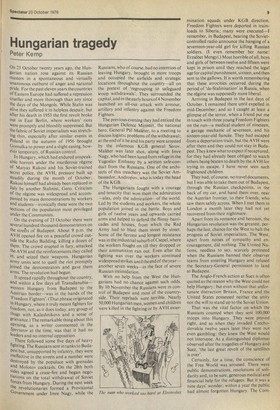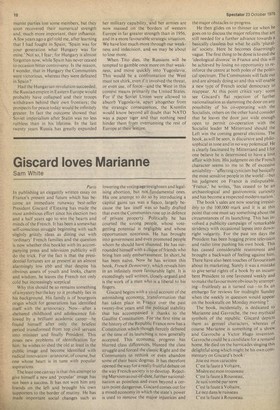Hungarian tragedy
Peter Kemp
On 23 October twenty years ago, the Hungarian nation rose against its Russian masters in a spontaneous and virtually unanimous outburst of anger and national Pride. For the past eleven years the countries of Eastern Europe had suffered a repression crueller and more thorough than any since the days of the Mongols. While Stalin was alive they suffered it in helpless despair, but after his death in 1953 the first revolt broke out in East Berlin, where workers' riots were promptly and bloodily suppressed. But the fabric of Soviet imperialism was stretching thin, especially after similar events in Poland in the autumn of 1956 brought Gomulka to power and a slight easing, however temporary, of Russian control.
In Hungary, which had endured unspeakable horrors under the murderous regime of Matyas Rakosi and his Soviet-trained secret police, the AVH, pressure built up steadily during the month of October; Rakosi himself had already been replaced in July by another Stalinist, Gero. Criticism of the regime was widespread and accompanied by mass demonstrations by workers and students—ironically these were the two sections of the population most privileged under the Communists.
On the evening of 23 October there were several hundred thousand demonstrators on the streets of Budapest. About 9 p.m. the AV H opened fire on a peaceful crowd outside the Radio Building, killing a dozen of them. The crowd erupted in fury, attacked the AVH and the reinforcements they called in, and seized their weapons. Hungarian 'my units sent to quell the riot promptly Joined the demonstrators and gave them arms. The revolution had begun.
'It spread rapidly throughout the country, and within a few days all Transdanubiawestern Hungary from Budapest to the Austrian border—was in the hands of the .Freedom Fighters'. (That phrase originated in Hungary, where it truly meant fighters for freedom, not, as it does today, any group of thugs with Kalashnikovs and a sense of grievance.) The remarkable thing about this Uprising, as a writer commented in the Spectator at the time, was that it had no leaders and no internal opposition.
There followed some five days of heavy fighting. The Russians sent in tanks to Budapest but, unsupported by infantry, they were ineffective in the streets and a number were destroyed by the populace with grenades and Molotov cocktails. On the 28th both Sides agreed a cease-fire and began negotiations on the total withdrawal of Soviet forces from Hungary. During the next week the revolutionaries formed a Provisional Government under Imre Nagy, while the
Russians, who of course, had no intention of leaving Hungary. brought in more troops and occupied the airfields and strategic locations throughout the country—all on the pretext of 'regrouping to safeguard troop withdrawals'. They surrounded the capital, and in the early hours of 4 November launched an all-out attack with armour, artillery and infantry against the Freedom Fighters.
The previous evening they had enticed the Hungarian Defence Minister, the national hero, General Pal Maleter, to a meeting to discuss logistic problems of the withdrawal; at the end of it he and his party were arrested by the infamous KGB general Serov. Maleter was later shot, along with Imre Nagy, who had been lured from refuge in the Yugoslav Embassy by a written safe-conduct from the Russians. One of the architects of this treachery was the Soviet Ambassador, And ropov, who is today the head of the KGB.
The Hungarians fought with a courage and tenacity that won them the admiration —alas, only the admiration—of the world. Led by the students and workers, the whole population joined in the battle. Boys and girls of twelve years and upwards carried arms and helped to defend the flimsy barricades and houses, from which the Red Army had to blast them street by street. Some of the fiercest and longest resistance was in the industrial suburb of Csepel, where the workers fought on till they dropped or their ammunition ran out. Even after the fighting was over the workers continued widespread strikes until theend of the year— another seven weeks—in the face of severe Russian intimidation.
With no help from the West the Hungarians had no chance against such odds. By 10 November the Russians were in control of Budapest and most of the countryside. Their reprisals were terrible. Nearly 50,000 Hungarian men, women and children were killed in the fighting or by AVH exter
mination squads under KGB direction. Freedom Fighters were deported in trainloads to Siberia; many were executed—I remember, in Budapest, hearing the Sovietcontrolled radio announce the hanging of a seventeen-year-old girl for killing Russian soldiers. (I even remember her name: Erzsebet Mengyi.) Most horrible of all, boys and girls of between twelve and fifteen were kept in prison until they reached the legal age for capital punishment, sixteen, and then sent to the gallows. It is worth remembering that these atrocities occurred during the period of 'de-Stalinisation' in Russia, when the regime was supposedly more liberal.
Arriving in Budapest in the last days of October, I remained there until expelled in mid-December; and so I caught at least a glimpse of the terror, when a friend put me in touch with three young Freedom Fighters on the run—a medical student of nineteen, a garage mechanic of seventeen, and his sixteen-year-old fiancee. They had escaped .from a deportation train, but the AVH were after them and they could not stay in Budapest. They knew what to expect if recaptured, for they had already been obliged to watch others being beaten to death by the AVH for trying to escape. I have never seen such frightened children.
They had, of course, no travel documents. but I was able to take them out of Budapest. through the Russian checkpoints, in the back of my car, and hand them over, near the Austrian frontier, to their friends, who saw them safely across. When I met them in London a month later they had not yet recovered from their nightmare.
Apart from its romance and heroism, the Hungarian revolution was the greatest, perhaps the last, chance for the West to halt the progress of Soviet imperialism. The West, apart from noises of sympathy and encouragement, did nothing. The United Nations, needless to say, scarcely protested when the Russians banned their observer teams from entering Hungary and refused the Secretary-General permission to land at Budapest.
The Anglo-French action at Suez is often quoted as the reason why the West could not help Hungary; but even without that unfortunate distraction Britain, France and the United States possessed neither the unity nor the will to stand up to the Soviet Union.
That was the vital factor on which the Russians counted when they sent 100,000 troops into Hungary. They were proved right, and so when they invaded Czechoslovakia twelve years later they were not even gambling: they knew the West would not intervene. As a distinguished diplomat observed after the tragedies of Hungary and Suez, the last great revolt of the satellites is over'.
Certainly, for a time. the conscience of the Free World was aroused. There were public demonstrations, resolutions of solidarity and, to be sure, generous medical and financial help for the refugees. But it was a nine days' wonder; within a year the public had almost forgotten Hungary. The Com munist parties lost some members, but they soon recovered their numerical strength and, much more important, their influence. A few years ago a girl told me, after learning that I had fought in Spain, 'Spain was for your generation what Hungary was for mine.' Not so, I fear; for Hungary is almost forgotten now, while Spain has never ceased to occasion bitter controversy. Is the reason, I wonder, that in Hungary the Communists were victorious, whereas they were defeated in Spain?
Had the Hungarian revolution succeeded, the Russian empire in Eastern Europe would probably have collapsed and their troops withdrawn behind their own frontiers; the prospects for peace today would be infinitely greater. In fact the outcome showed that Soviet imperialism after Stalin was no less ruthless than in his lifetime. In the last twenty years Russia has greatly expanded her military capability, and her armies are now massed on the borders of western Europe in far greater strength than in 1956, and in a more favourable strategic situation. We have lost much more through our weakness and indecision, and we may be about to lose more.
When Tito dies, the Russians will be tempted to gamble once more on that weakness, and move quickly into Yugoslavia. This would be a confrontation the West must not shirk, even if it involved the threat, or even use, of force—and the West in this context means primarily the United States. For if the Soviet Union were allowed to absorb Yugoslavia, apart altogether from the strategic consequences, the Kremlin would know beyond all doubt that NATO was a paper tiger and that nothing need hinder them from overrunning the rest of Europe at their leisure.











































 Previous page
Previous page